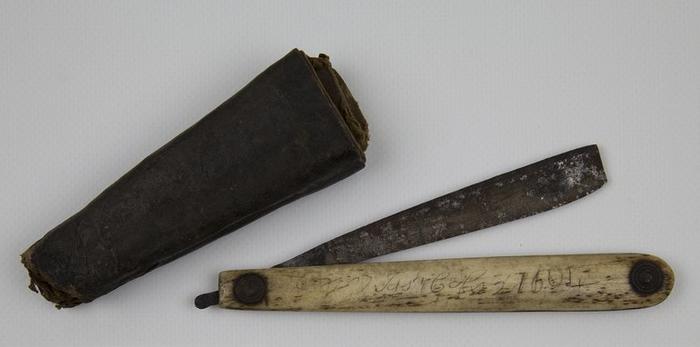Results 1 to 2 of 2
Hybrid View
-
04-14-2021, 01:53 AM #1
 "1604" Shakespeare-era straight razor
"1604" Shakespeare-era straight razor
Came across this article from 2014, haven't noticed it mentioned here, though I might have missed it. Thought it was interesting. Despite the depictions of 'hatchet'-type 17th century razors, here's a very early 17th century razor which looks rather like much later 18th-century razors:

A cased razor; brown leather covered case with two compartments; steel razor with bone handle, two steel rivets hold handle together and form swivel point; scratched on handle the date '1604', the name 'Josh Cols' and the number '2' , c.1600s, 9.8 (case), 13 (handle), 12.4 (blade) x 1.8-3.5 (case), 1.7 (handle), 1.4-.08 (blade) cm, The Shakespeare Birthplace Trust.
from https://www.shakespeare.org.uk/explo...objects-razor/ (where there is a bit more discussion)This particular razor is housed in the museum collection of the Shakespeare Birthplace Trust and dates to the early seventeenth century. The blade itself is made of steel and it has a bone handle with the date ‘1604’, the name ‘Josh Cols’ and the number ‘2’ scratched into it (although unfortunately these details are not visible in this photo!) It was apparently found between the joist and wall of a front bedroom in a property adjoining the old theatre in Stratford: could this have been a deliberate concealment along the lines of the shoes described in Peter Hewitt’s blog [here], and could this property have been the premises of a Stratford barber-surgeon? The fact that the razor has its own leather case and has been marked with what was presumably the owner’s name might suggest that it was the property of a professional, although it is possible that it could have been a gift for a man of means. But what about the number ‘2’ also scratched onto the handle? Could this be further proof of the razor’s having belonged to a barber-surgeon, who wished to identify that it was his second best out of a set?
-
The Following 8 Users Say Thank You to benhunt For This Useful Post:
DoughBoy68 (04-14-2021), hatzicho (05-28-2021), jfk742 (04-14-2021), karlej (04-16-2021), markbignosekelly (04-14-2021), outback (04-14-2021), RezDog (04-14-2021), Tjh (05-27-2021)
-
05-27-2021, 01:21 AM #2Senior Member

- Join Date
- Mar 2018
- Location
- Toronto
- Posts
- 216
Thanked: 15
Wow I would 100% have believed that to be an 18th century razor
(in fact I'm pretty sure at least 2 of the razors I own looked exactly like that prior to restoration) ...given how much changed between 18 and late 19th century this is surprising.
Is this unusual, or was there not much change prior to mid 1700s (which would make sense if you just say much of the big changes happened partly due to improvements in metallurgy and the advent of the industrial revolution)
What a shame though, someone should restore that and shave with it!Last edited by Tjh; 05-27-2021 at 01:24 AM.


 5Likes
5Likes LinkBack URL
LinkBack URL About LinkBacks
About LinkBacks






 Reply With Quote
Reply With Quote